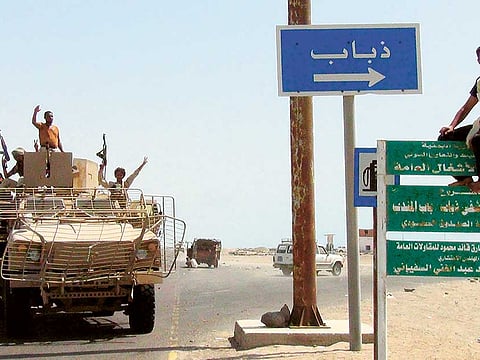Iran’s supply route to Yemen blocked — analysts
Fight against Al Houthis expected to intensify in the coming days with Yemeni forces heading to Sana’a

Dubai: The recent recapture of the strategic Bab Al Mandab strait by the Saudi-coalition backed Yemeni government forces has blocked Iran’s arms supply route to its militias in Yemen, and was the reason behind Al Houthi militants agreeing to a ceasefire, military experts have said.
On the ground, fighting against the Iran-backed Al Houthis was expected to intensify in the coming days with Yemeni forces heading to Sana’a.
“The main goal is to stop Iran from sending anything to its Al Houthi allies,” said Riyad Qahwaji, CEO of Dubai-based Institute for Near East and Gulf Military Analysis (INEGMA), commenting on the significance of recapturing Bab Al Mandab.
“Accordingly, regaining the control over Bab Al Mandab is a way to tighten the maritime sanctions against Al Houthis and stopping them from receiving weapons from Iran or any other party in the Horn of Africa, where there are several terrorist groups that can supply Al Houthis with weapons,” he told Gulf News.
“Cutting transportation routes and stopping weapons shipments constitute major steps in the war against the foe.”
Bab Al Mandab is one of the strategic waterways in the world, and is considered the southern gateway to the Red Sea, which links the Mediterranean Sea to the Indian Ocean.
It is estimated that nearly 7 per cent of oil shipments from the Gulf region pass through the strait heading towards the northern Mediterranean through the Suez Canal.
The approximately 22-mile wide waterway is also the route for shipments from the north to the south.
Tens of ships pass through the waterway everyday heading to the Suez Canal, Egyptian military expert Jamal Mazloum said.
Regaining control over the strategic strait from Al Houthi militants means “stopping Iran from [having] any authority over it,” Mazloum said.
Iran has in the past threatened to block the Strait of Hormuz in the eastern part of the Peninsula when its relations with the West were tense over its nuclear programme, before reaching an agreement with global powers.
Bab Al Mandab is also vital for maritime shipping through the Egyptian canal lines, which were expanded earlier this year, Mazloum added.
“It would have been a catastrophe had Iran gained control [over] the two straits,” said Mazloum.
After regaining control over Marib, military experts said the Saudi-led coalition forces supporting the Yemeni government forces have gained proximity to the capital. The eastern route comes under their control.
“Taiz is the second important target,” said Qahwaji. After the fighting over the city is decided in favour of government forces, the battle over Sana’a is expected to begin.
Sign up for the Daily Briefing
Get the latest news and updates straight to your inbox



